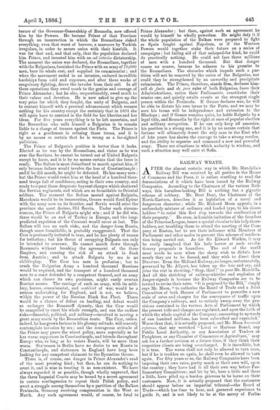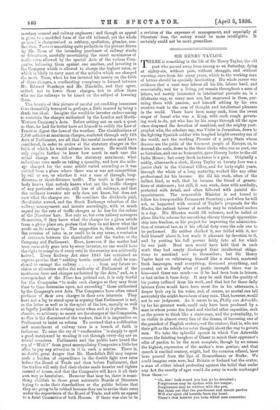RAILWAY WRATH.
AFTER the almost ecstatic way in which Mr. Mundella's Railway Bill was received by all parties in the House of Commons and the Press, it is rather startling to read the
denunciations of it which have been issued by the Railway Companies. According to the Chairmen of the various Rail- ways, this harmless-looking Bill is nothing but a gigantic scheme of robbery. Mr. Dent Dent, the Chairman of the North-Eastern, describes it as legislation of a novel and dangerous character ; while Mr. Richard Moon appeals, in a melancholy mixture of ordinary and loaded type, to his share- holders " to resist. this first step towards the confiscation of their property." He even, in humble imitation of the founders of the PrimroseLeague, issues a special circular to his lady share- holders, not troubling them to attend the meeting of the Com- pany at Euston, but to use their influence with Members of Parliament and other males to prevent this scheme of confisca- tion being carried out. As for Sir Edward Watkin, it may be easily imagined that his holy horror at such revolu- tionary proposals is boundless. The end of the world must needs be near when the sheep wish to dictate how nearly they are to be fleeced, and they wish to direct their Directors. Even the Midland Railway, no longer, unfortunately, governed by Mr. Ailport, has taken up the hue and cry, and joins the rest in shouting, " Stop, thief !" to poor Mr. Mundella. And all this shrieking of railway-whistles and explosion of danger-signals is because the Railway Companies are to be invited to revise their rates. "It is proposed by the Bill," simply says Mr. Moon, " to authorise the Board of Trade and a Joint Committee of both Houses of Parliament to prescribe a new scale of rates and charges for the conveyance of traffic upon the Company's railways, and to entirely sweep away the pro- visions contained in the various Acts of Parliament by which the present tolls and charges are regulated, and upon the faith of which the whole capital of the Company, amounting to upwards of one hundred millions, has been subscribed and expended." Worse than that, it is actually proposed, and Mr. Moon horrescit referens, that any wretched '• Local or Harbour Board, any Public Local Authority, or any Association of Traders or Freighters, or any Chamber of Commerce or Agriculture," may ask for a further revision at a future time, if they think their respective clients are being overcharged. It is incredible, bat it is true. The worm shall not only be allowed to turn once, but if he is trodden on again, he shall even be allowed to turn again. For fifty years or so, the Railway Companies have been imposing their own rates, pretty much at their own will, upon the country ; they have had it all their own way before Par- liamentary Committees ; and bit by bit, here a little and there a little, have piled up a burden grievous to be borne on their customers. Now, it is actually proposed that the customers should appear before an impartial tribunal—the Board of Trade—which has time to hear, and garnered experience to guide it, and is not likely to be at the mercy of Parlia-
mentary counsel and railway engineers ; and though an appeal is given to a modified form of the old tribunal, yet the whole proposal is characterised as robbery, spoliation, plunder, con- fiseltion. There is something quite pathetic in the picture drawn by- Mr. Moon of the intending purchaser of railway stocks or 'debentures, carefully ascertaining the exact maximums of traffic rates allowed by the special Acts of the various Com- panies, balancing them against one another, and investing in the Company which is allowed to charge the highest rates, or which is likely to carry most of the articles which are charged the most. Then, when he has invested his money on the faith of those charges, a confiscating conspiracy is formed between Mr.. Edward Stanhope and Mr. Mundella, and they agree, indeed, not to lower those charges, but to allow those who use the railways to be heard on the subject of lowering them.
The beauty of this picture of careful yet confiding innocence thus shamefully betrayed is, perhaps, a little marred by being a shade too ideal. Imagine the would-be investor endeavouring to ascertain the charges authorised by the London and North- Western Company's Acts. Before setting out on such a quest as that, he had far better have set himself to codify the Law of Trusts or digest the laws of the weather. The classifications of 2,340 articles at maximum charges, scattered through only 128 Acts of Parliament, are all that the careful investor need have considered, in order to arrive at the statutory charges on the faith of which he would advance his money. He would then only require further to know how much in each case the actual charge was below the statutory maximum, what reductions were made on taking a quantity, and how the mile- age charged for the same article varied according as it was carried from a place where there was or was not competition by rail or sea, or whether it was a case of through, long- distance, or short-distance traffic. The truth is that every- body knows that nobody knows what are the traffic charges of .any particular railway, still less of all railways, and that the ordinary investor not only does not know, but does not care what the charges are. He considers the dividends paid, the district served, and the Stock Exchange valuation of the railway management, and invests accordingly, with as much regard for the rate of traffic charges as he has for the colour of the Directors' hair. Not only so, but even railway managers themselves, if they know what the charges for a given article from a given place are, profess that they do not know what the profit on its carriage is. The suggestion is, then, absurd that the- revision of rates is, or could be in any sense, a rescission of contracts between the shareholder and the trader, or the Company and Parliament. Even, however, if the matter had been accurately gone into by every investor, no one would have the'right to complain if every rate in the country was arbitrarily halved. Every Railway Act since 1845 has contained an express proviso that nothing herein contained shall be con- strued to exempt the railway from any future re- vision or alteration under the authority of Parliament of the maximum fares and charges authorised by the Aots," and, as a correspondent of the- Times has pointed out, it is only lawful for the Companies " to make such charges as they may from time to time determine upon, not exceeding " those authorised by the Company's own Acts. The Companies have often raised portions of their own charges in their own interests. They have not a leg to stand upon in arguing that Parliament is not, in- the letter as well as in the spirit of the law, morally as well as legally justified in revising rates when and as- it pleases. So chaotic, so arbitrary, so secret are the charges of the Companies, so dire is the discontent of the traders, that it is imperative on Parliament to insist on reform. To contend that a codification and amendment of railway rates is a breach of faith is ludicrous. To raise the cry of " confiscation " is simply to spoil a good watchword by wearing it out through every-day use on trivial occasions. Parliament and the public have heard the cry of " Wolf 1" from great monopolising Companies a little too often to pay any attention to it in such a matter. There is, no doubt, great danger that Mr. Mundella's Bill may impose such a burden of expenditure in the double fight over rates before the Board of Trade and then before Parliament, that the traders will only find theirchains made heavier and tighter instead of looser, and that the Companies will have it all their own way as heretofore. However that may be, there is some- thing childish in these great autocratic Boards of Directors trying to make their shareholders or the public believe that they are going to be robbed because they are to revise their rates under the supervision of the Board of Trade, and with an appeal to a Joint Committee of both Houses. If there was also to be
a revision of the expenses of management, and especially of Directors' fees, the outcry would be more intelligible. It certainly could not be more groundless.



































 Previous page
Previous page